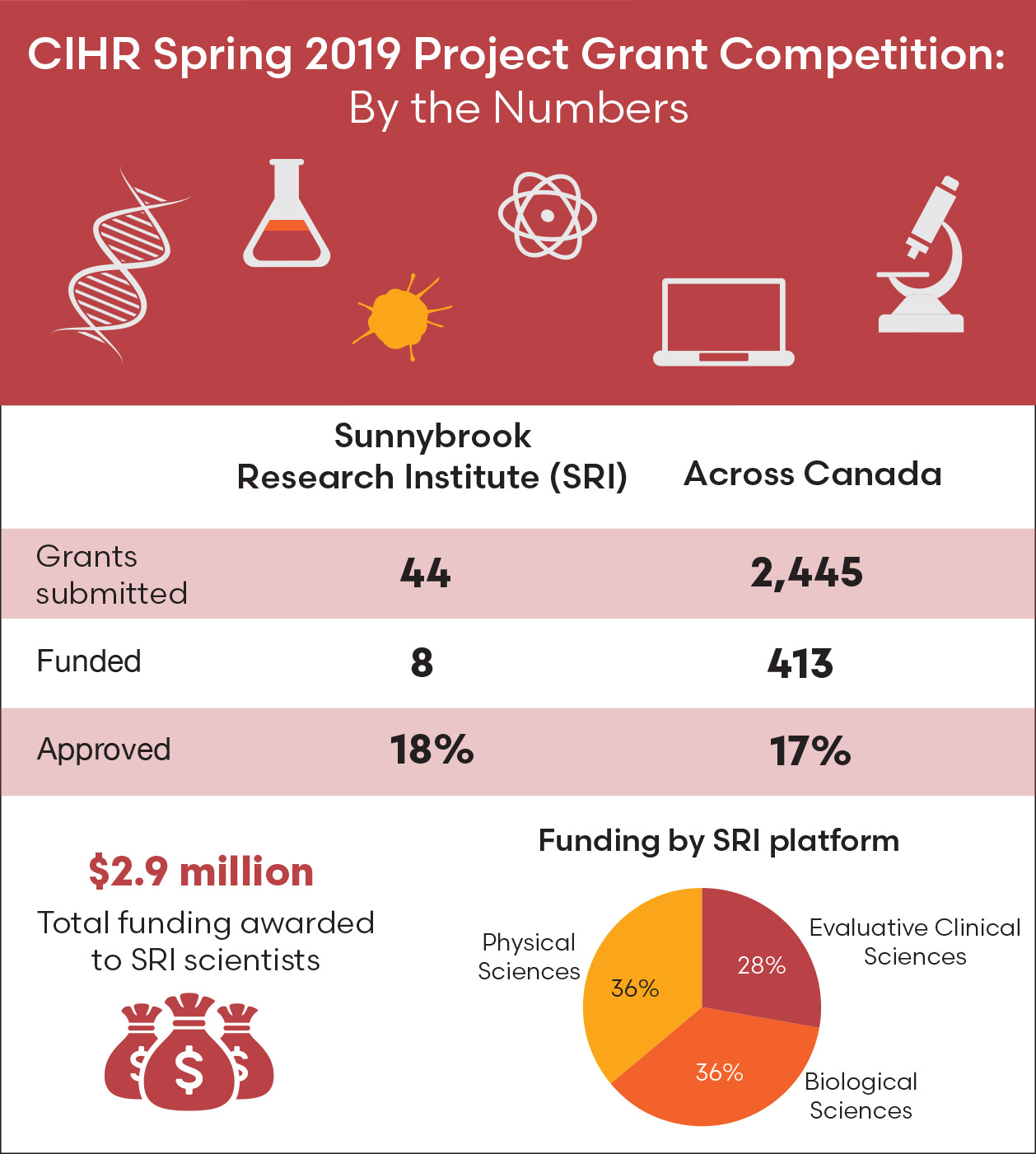Scientists secure investment from federal research funding agency
The Canadian Institutes of Health Research (CIHR) has awarded scientists at Sunnybrook Research Institute (SRI) $2.9 million for eight Project Grants in the federal funding agency’s Spring 2019 competition.
“I applaud the scientists and their teams on their success. These awards recognize their excellence in what remains a tight funding climate. The investment by CIHR will help us carry out our mandate of inventing the future of health care by advancing innovative approaches to treating diseases of the brain and heart, along with cancer, so that we can translate discoveries to patients sooner,” says Dr. Michael Julius, vice-president of research at SRI and Sunnybrook.
Dr. Julie Hallet, an associate scientist in the Odette Cancer Research Program, was “thrilled” to learn of her success. She is the principal investigator of two proposals that were approved. In one, she will receive $248,625 over two years. Hallet and co-investigator Dr. Natalie Coburn, also an associate scientist in the Odette Cancer Research Program, are leading a team that is analyzing health data to understand and predict long-term outcomes of older adults who have cancer surgery. The team is researching the extent to which elderly people are able to live independently after their operations.
They will study, for example, how often the seniors use home care services, change residences or are admitted to long-term care facilities. They are also developing a predictive tool for clinical use that can assess someone’s risk of needing home care consistently in the long run after cancer surgery.
As a surgical oncologist, Hallet sees firsthand the need for this data. “We want to know what those outcomes are so that we can discuss them with patients when we counsel them about surgery, so they know what to expect and they can prepare for surgery [better]. If they know they might not be able to return home, or might need care at home in the long term, they and their families might prepare differently,” she says.
With the second grant, Hallet, and co-investigators Coburn and Dr. Jeannie Callum, an associate scientist in the Tory Trauma Research Program, are studying variation in the use of red blood cell transfusions in patients who have surgery for gastrointestinal cancer. Their proposal ranked second among 48 applications by the committee of experts that reviewed it. Hallet will receive $210,376 over two years to conduct the study. She notes that about one-half of all blood transfusions given to people for gastrointestinal cancer surgery are unnecessary. This is problematic because not only are blood products scarce, but transfusions also increase the risk of complications, death and cancer recurrence.
The ultimate goal, says Hallet, is to develop metrics that can be used for quality assurance and monitoring within institutions. For example, a hospital can learn whether its transfusion rate is different from other institutions; the reason for it, if so; and how it can be improved. “The idea is to standardize care delivery so that we can minimize the use of blood transfusions for resource reasons and to improve patient outcomes,” she says.
News of being awarded a grant came as a pleasant surprise to Dr. Bradley MacIntosh, a senior scientist in Physical Sciences. “I was incredulous. The competition for CIHR funding is fierce, as the Canadian landscape for scientific talent is truly inspiring,” he says.
He was awarded $665,550, the second-largest SRI award. Over five years, he will develop new ways to visualize and understand cerebral small vessel disease. In this condition, blood flow through the small blood vessels of the brain is impaired or restricted. It is a major cause of stroke and dementia.
There are still many unanswered questions about cerebral small vessel disease, says MacIntosh, who is working with SRI brain scientists Drs. Sandra Black, Simon Graham, Walter Swardfager and Richard Swartz on the grant. “This project will help us assess the impact of small vessel disease through pictures that reflect the health of the brain's blood vessels. We hope this information can be used to guide small vessel disease treatment,” he says. One of the aims is to provide new MRI markers of the disease, which may be useful in screening people who are at risk of developing dementia.
Other SRI scientists granted funding in the competition are as follows:
Dr. Isabelle Aubert, a senior scientist in Biological Sciences, was awarded a one-year grant worth $100,000. She will explore the use of genetic engineering of brain cells so that they can make antibodies against the toxic proteins related to the pathology of Alzheimer’s disease.
Dr. Peter Austin, a senior scientist in Evaluative Clinical Sciences, will receive $206,550 over three years to develop statistical methods for health services research. These tools aim to improve monitoring of the health care system, and to assess the impact of interventions to improve the performance of hospitals.
Dr. Damien Gallagher, a psychiatrist at Sunnybrook, is working with SRI scientists Drs. Susan Bronskill, Nathan Herrmann, Alex Kiss and Krista Lanctôt. Their research aims to uncover why older adults with depression have an increased risk of Alzheimer’s disease. The team will also explore whether depression, which is more common in women, may be one reason why more women develop Alzheimer’s disease than men. Gallagher was awarded $126,225 over two years.
Dr. David Goertz, a scientist in Physical Sciences, will receive $374,851 over four years. With Dr. Kullervo Hynynen, director of Physical Sciences, and Dr. Bradley Strauss, a senior scientist in the Schulich Heart Research Program, Goertz is developing a catheter-based technology that uses focused ultrasound to enhance a therapy for blocked vessels of the heart. The approach uses focused ultrasound to pop small bubbles near the blockage, so that the artery-clogging plaque is damaged in a way that makes collagenase, a drug invented by Strauss, work better and faster.
Dr. Burton Yang, a senior scientist in Biological Sciences, was awarded a five-year grant of $925,650, the largest of the awards to SRI researchers. He is studying the molecular mechanisms behind the remodelling of the heart due to aging. He will focus on the role of individual ribonucleic acids, molecules that carry instructions from DNA, in heart disease.
The CIHR earmarked $275 million for 382 Project Grants and 21 Bridge Grants. The average non-bridge grant is worth about $714,000 over four-and-a-half years. More than 2,400 applications were submitted. The national success rate was 17%, which SRI edged past, at 18%.

Text-only version of above infographic
CIHR Spring 2019 Project Grant Competition: By the numbers
| Sunnybrook Research Institute (SRI) | Across Canada | |
|---|---|---|
| Grants submitted | 44 | 2,445 |
| Funded | 8 | 413 |
| Approved | 18% | 17% |
Total funding awarded to SRI scientists: $2.9 million.
Funding by SRI platform:
Biological Sciences: 36%
Evaluative Clinical Sciences: 28%
Physical Sciences: 36%
In a nutshell
- The Canadian Institutes of Health Research has awarded scientists at Sunnybrook Research Institute (SRI) $2.9 million for eight Project Grants in the federal funding agency’s Spring 2019 competition.
- The investment will advance innovative approaches to treating cancer, and diseases of the brain and heart.
- These approaches aim to detect disease sooner, improve treatments and outcomes, and conserve health system resources.





